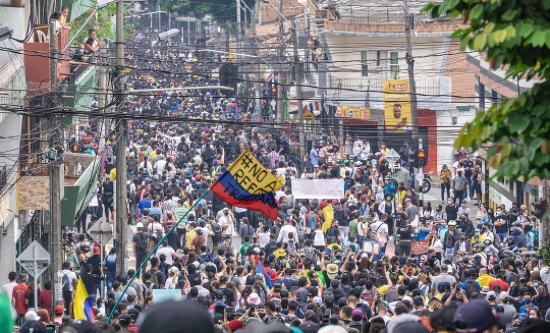
The huge protests that tore through Colombia from 28 April to 15 June 2021 reignited on 20 July, Independence Day. In the main cities, demands for justice for the 56 youths killed, the 49 alleged rapes, and some 2,000 injuries, including loss of eyes, through police brutality, and for social leaders murdered by the ruling class were prominent. Colombia ranks second in the world in terms of violent deaths per day of protest. With astonishing hypocrisy, the Colombian government condemned the jailing of anti-government protesters in Cuba.
The rallies supported ten initiatives, presented by the National Strike Committee to Congress. These include dissolving the nation’s riot police, zero fees for public university students, guarantees to allow peaceful protests, an improved health system, support for agricultural production, actions to curb gender violence, and basic monthly payments of $260 to ten million people. The current state provision is a monthly $40 to three million families.
Colombia’s economy contracted 7% last year, pushing three million more people into poverty. President Duque has no intention of solving the problems created by imperialism since he works on its behalf.
Colombia’s ruling class has, like all such classes serving imperialism, always used violence. The mass assassinations of the legal socialist opposition, the Patriotic Union in the 1980s and 1990s (over 3,000 killed), the continuous murders of trade unionists (172 since 2016), journalists (52 between 1992-2021) and human rights workers and social leaders (over 600 since 2016), demonstrate what the ruling class will do to keep power. Military campaigns against rural workers and small landed farmers, clearing space for large landowners, have produced 7.7 million internal refugees. Armed gangs are deployed to export cocaine. The current murder campaign against demobilised FARC guerrillas has killed 271 since 2016. Even UN Security Council members recently expressed concerns over ‘the constant sieges and assassinations’ of ex-combatants.
FARC resurgence
FARC members who rejected the 2016 Peace Agreement, plus many threatened by the state’s betrayal of that agreement, have returned to the fight. Duque’s helicopter was attacked on 26 June, an army barracks was attacked on 15 June, injuring 44, and there have been other recent actions by Bloc 33, a FARC branch. They stated, ‘our actions do not end here, we say to the president that you are part of the war and while there are no guarantees for the vast majority, our rifles will not be silenced’.
Duque’s spokesperson accused Venez-uela of sheltering the Magdalena Medio Bloc of FARC dissidents and the National Liberation Army. The FBI and the US Southern Command work with the Colombian armed forces to defeat the revolutionaries. Duque asked the US to add Venezuela to its list of countries ‘promoting terrorism’, displacing attention from Colombia’s domestic crisis. In response, Venezuelan foreign affairs minister Jorge Arreaza accused Duque of being ‘the head of a narco-government’ of a country ‘full of violence and armed groups, with its economy and political elite dependent on the drugs trade, a repressive police, daily massacres and killings of social leaders, exporters of mercenaries involved in major assassinations …’
Declassified UK reports that Wendy Morton, the British minister responsible for the Americas, ‘told Parliament that the UK military personnel deployed in Colombia support the country’s armed forces as well as the police, including “capacity building support” to the Colombian Ministry of Defence’. In the past year, Colombian military officers attended five courses in Britain.
The Colombian state is a reactionary and violent outpost of imperialism in the Americas. The sustained protests in the cities and the continuing struggle in the countryside are changing the political landscape. Senator Gustavo Petro, a former member of the revolutionary M-19 rebel group, now leads in polls for the 2022 election race, with twice the support of his closest competitor, the ‘Liberal’ Sergio Fajardo. Mass mobilisation has not been subdued by violence and continues to organise.
Alvaro Michaels
Fight Racism! Fight Imperialism! No 283, August/September 2021




